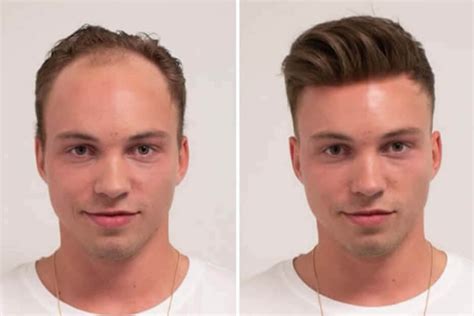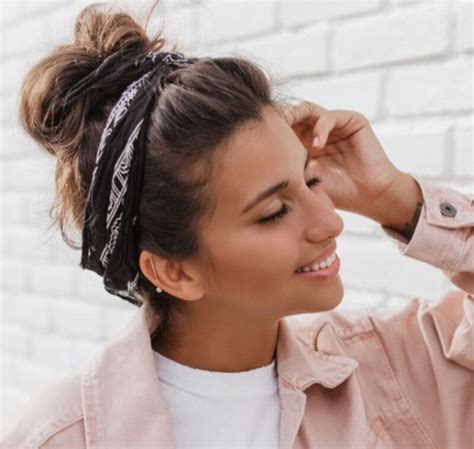Thinning hair is a common problem that affects millions of people around the world. It can be caused by a variety of factors, including genetics, aging, and certain medical conditions. While there are a number of treatments available for thinning hair, many people find that headbands can be a helpful way to conceal the condition and improve their self-confidence.

Types of Headbands for Thinning Hair
There are a variety of different types of headbands that can be used to hide thinning hair. Some of the most popular options include:
-
Thin headbands: These headbands are made from a thin, flexible material that can be easily hidden under hair. They are a good option for people who want to add a touch of style to their look without making it obvious that they are wearing a headband.
-
Thick headbands: These headbands are made from a thicker material that can provide more coverage for thinning hair. They are a good option for people who want to conceal their thinning hair more effectively.
-
Headbands with embellishments: These headbands are decorated with beads, sequins, or other embellishments. They can add a touch of glamour to your look and help to distract from thinning hair.
-
Headbands with built-in hair: These headbands have a strip of hair attached to them. This can help to create the illusion of fuller, thicker hair.
Benefits of Wearing Headbands to Hide Thinning Hair
There are a number of benefits to wearing headbands to hide thinning hair. These benefits include:
-
Improved confidence: Wearing a headband can help to boost your confidence by making you feel more comfortable with your appearance.
-
Concealed hair loss: Headbands can effectively conceal thinning hair, making it less noticeable to others.
-
Added style: Headbands can add a touch of style to your look, even if you are experiencing thinning hair.
-
Versatility: Headbands can be worn in a variety of ways, so you can find a style that suits your individual needs.
How to Choose the Right Headband for Thinning Hair
When choosing a headband to hide thinning hair, it is important to consider the following factors:
-
Type of headband: There are a variety of different types of headbands available, so it is important to choose one that is appropriate for your individual needs.
-
Material: Headbands are made from a variety of materials, including fabric, metal, and plastic. Choose a material that is comfortable to wear and that will not damage your hair.
-
Size: Headbands come in a variety of sizes, so it is important to choose one that fits your head comfortably.
-
Color: Headbands are available in a variety of colors, so you can choose one that matches your hair color or your outfit.
Tips for Wearing Headbands to Hide Thinning Hair
Here are a few tips for wearing headbands to hide thinning hair:
-
Choose a headband that is the right size: A headband that is too tight will be uncomfortable to wear and may damage your hair. A headband that is too loose will not stay in place and will not effectively conceal your thinning hair.
-
Place the headband correctly: The headband should be placed on your head so that it covers the areas of thinning hair that you want to conceal.
-
Secure the headband: If the headband is not secure, it may slip off your head and reveal your thinning hair. You can secure the headband by using bobby pins or hairspray.
Conclusion
Headbands can be a helpful way to conceal thinning hair and improve your self-confidence. By choosing the right headband and wearing it correctly, you can create the illusion of fuller, thicker hair.
FAQs
1. What are the most common causes of thinning hair?
The most common causes of thinning hair include:
- Genetics: Thinning hair can be inherited from your parents.
- Aging: Hair follicles become weaker as we age, which can lead to thinning hair.
- Hormonal changes: Hormonal changes, such as those that occur during pregnancy, menopause, and thyroid problems, can lead to thinning hair.
- Medical conditions: Certain medical conditions, such as alopecia areata and lupus, can cause thinning hair.
- Medications: Some medications, such as chemotherapy and blood thinners, can cause thinning hair.
2. What are the treatments for thinning hair?
There are a number of treatments available for thinning hair, including:
- Medications: Medications, such as minoxidil and finasteride, can help to slow down or stop hair loss.
- Hair transplants: Hair transplants involve removing hair follicles from one area of the scalp and transplanting them to areas of thinning hair.
- Laser therapy: Laser therapy uses low-level lasers to stimulate hair growth.
- Platelet-rich plasma (PRP) therapy: PRP therapy involves injecting platelets into the scalp to stimulate hair growth.
3. How can I prevent thinning hair?
There is no surefire way to prevent thinning hair, but there are a number of things you can do to reduce your risk, including:
- Eat a healthy diet: A healthy diet that is rich in fruits, vegetables, and whole grains can help to nourish your hair follicles and promote healthy hair growth.
- Get regular exercise: Regular exercise can help to improve blood circulation to the scalp, which can promote healthy hair growth.
- Manage stress: Stress can contribute to thinning hair. Find healthy ways to manage stress, such as exercise, yoga, or meditation.
- Avoid harsh hair care products: Harsh hair care products, such as those that contain sulfates or parabens, can damage your hair and lead to thinning hair.
4. What are the best headbands for thinning hair?
The best headbands for thinning hair are those that are made from a thin, flexible material that can be easily hidden under hair. They should also be the right size for your head and fit comfortably. Some of the best headbands for thinning hair include:
- Halo headbands: Halo headbands are made from a thin, flexible wire that is covered in fabric. They are easy to wear and can be hidden under hair.
- Elastic headbands: Elastic headbands are made from a thin, elastic material. They are comfortable to wear and can be adjusted to fit your head.
- Headbands with built-in hair: Headbands with built-in hair can help to create the illusion of fuller, thicker hair. They are a good option for people who want to conceal their thinning hair more effectively.
5. How can I wear headbands to hide thinning hair?
Here are a few tips for wearing headbands to hide thinning hair:
- Choose a headband that is the right size: A headband that is too tight will be uncomfortable to wear and may damage your hair. A headband that is too loose will not stay in place and will not effectively conceal your thinning hair.
- Place the headband correctly: The headband should be placed on your head so that it covers the areas of thinning hair that you want to conceal.
- Secure the headband: If the headband is not secure, it may slip off your head and reveal your thinning hair. You can secure the headband by using bobby pins or hairspray.
6. What are the benefits of wearing headbands to hide thinning hair?
There are a number of benefits to wearing headbands to hide thinning hair, including:
- Improved confidence: Wearing a headband can help to boost your confidence by making you feel more comfortable with your appearance.
- Concealed hair loss: Headbands can effectively conceal thinning hair, making it less noticeable to others.
- Added style: Headbands can add a touch of style to your look, even if you are experiencing thinning hair.
- Versatility: Headbands can be worn in a variety of ways, so you can find a style that suits your individual needs.
7. What are the best headbands for fine hair?
The best headbands for fine hair are those that are made from a thin, flexible material that will not weigh down your hair. Some of the best headbands for fine hair include:
- Halo headbands: Halo headbands are made from a thin, flexible wire that is covered in fabric. They are lightweight and will not weigh down your hair.
- Elastic headbands: Elastic headbands are made from a thin, elastic material. They are also lightweight and will not weigh down your hair.
- Headbands with built-in hair: Headbands with built-in hair can help to add volume to fine hair. They are a good option for people who want to create the illusion of fuller, thicker hair.
8. What are the best headbands for thick hair?
The best headbands for thick hair are those that are made from a thicker material that can hold your hair in place. Some of the best headbands for thick hair include:
- Thick headbands: Thick headbands are made from a thicker material that can provide more coverage for thinning hair. They are a good option for people who want to conceal their thinning hair more effectively.
- Headbands with embellishments: Headbands with embellishments, such as beads, sequins, or other embellishments, can help to add a touch of glamour to your look and distract from thinning hair.
- Headbands with built-in hair: Headbands with built-in hair can help to create the illusion of fuller, thicker hair. They are a good option for people who want to add volume to their hair.
